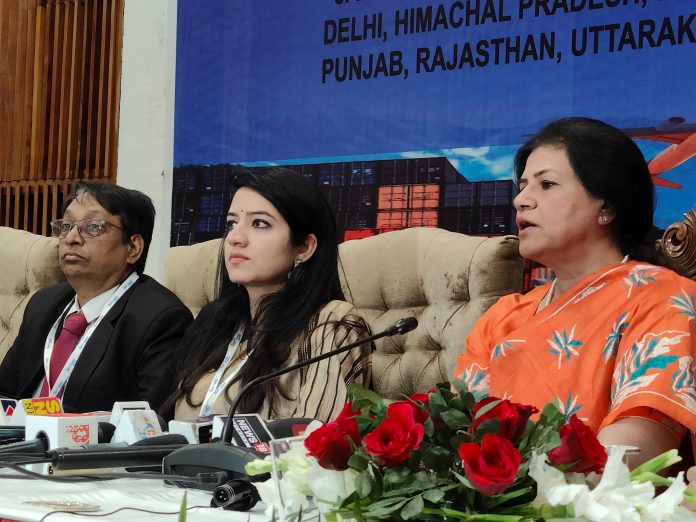Several initiatives underway using PM GatiShakti in Jammu and Kashmir
SRINAGAR: A two day regional workshop on PM GatiShakti National Master Plan (NMP), being organized by the Department for Promotion of Industry and Internal Trade (DPIIT) commenced today at SKICC in Srinagar.
The objective of the workshop is to improve logistics efficiency by enhancing connectivity to economic zones and industrial clusters, as well as to enhance public welfare through improved access to social infrastructure.
The workshop was chaired by Special Secretary, DPIIT Sumita Dawra and participants from eight states and Union Territories of the Northern Region are taking part in it.
PM GatiShakti is a transformative approach which was launched on October 13th, 2021 for building Next Generation Infrastructure which improves Ease of Living as well as Ease of Doing Business.
The inaugural day of the workshop featured discussions with infrastructure, economic, and social sector ministries and departments at the center and state levels. A demonstration of the adoption of PM Gati Shakti with a holistic approach and a demonstration of best practices by states and UTs also featured in the workshop.
Deliberations about the Unified Logistics Interface Platform (ULIP) to showcase the different components of logistics and a presentation by the Central Board of Indirect Taxes and Incomes (CBIC) on possibilities to develop Inland Container Depots (ICDs) and Container Freight Stations (CFS) in Jammu and Kashmir to boost exports across the country were the main highlights of the first day of the programme.
Addressing media at the end of the day long proceedings, Smt Dawra said that today we are at the crossroads of unprecedented growth in India, advancing with Prime Minister Shri Narendra Modi’s vision to make India a developed Nation by 2047.
She added that we are witnessing a strong growth of India across the social as well as the economic pillars of our nation that is surpassing its own record every year. To achieve our aim to become a USD 32.8 trillion economy by 2047, development of world class modern infrastructure is paramount, she further said.
Smt Dawra said that through today’s workshops, Northern States/UTs showcased the good work already done such as all-weather road connectivity in J&K, planning of ICD at Samba, planning for MMLPs, Cold Storage facilities, 64 Pharma units in Kathua, using PM GatiShakti National Master Plan.
She added that through this workshop, it is expected that all have got an opportunity to learn from each other’s best practices and in the spirit of cooperative federalism we will improve outreach and facilitate project planning and monitoring on the NMP/SMP platform. There is great scope to augment the pace of adoption at State, district and gram panchayat levels.
Additionally, 14 social sectors Ministries/Depts. have already been onboarded onto the NMP platform and are in advanced stages of integration, she further said.
Smt Dawra said that after the launch of PM GatiShakti National Master Plan, concerned Ministries and all States/UTs have been onboarded on mission-mode. Institutional frameworks have been set up, GIS-based individual portals and customised decision making tools have been developed, in-house capacities to adopt PM GatiShakti principles in project planning and implementation exist, and data based National Master Plan is being extensively used for project planning and implementation, she added.
With a view to promote comprehensive, holistic, and integrated infrastructure development across the country, along with bridging critical infrastructure gaps, and addressing relative infrastructure deficit, across various economic zones/ industrial parks, etc., the PM GatiShakti Area Approach is being adopted to develop 100 locations/economic nodes across the country.
The vision of Area Approach is to create adequate infrastructure for catalysing socio-economic development in a sustainable manner within a rational geographical location through a convergence approach.
To complement the PM GatiShakti NMP, the National Logistics Policy (NLP) was launched on 17th Sept. by Hon’ble PM. The vision of NLP is to drive economic growth and business competitiveness of the country through an integrated, seamless, efficient, reliable, green, sustainable and cost-effective logistics network by leveraging best in class technology, processes and skilled manpower. This will reduce logistics cost and improve performance.
Understanding the importance of regularly updating accurate GIS based data in project planning, States and UTs along with BISAG-N are tenaciously uploading quality data on individual portals through API integration, to the extent possible. This is making project planning easy, cost-effective, and accurate. Along with this, institutional frameworks are fully operational across all States/UTs. These reforms have significantly de-risked infrastructure investments for private sector and streamlines operations and decision making for States/UTs.
The role of States/UTs is very critical in identifying the infrastructure deficits and requirements for logistics facilities to enable comprehensive and holistic development of areas identified under this initiative.
DPIIT is undertaking several other initiatives such as the PM GatiShakti Area Approach. Hon’ble Prime Minister address at ET Global Investor Summit –“When we think about ‘Gati’ (speed) and ‘Shakti’ (power), it also has the concept of area development and the development of the people there.
The second day of the workshop will feature sessions on national logistics policy, monitoring of state logistics policies, and drawing an understanding of state logistics policy for creating sustainable cities.
Senior government officials from different central ministries and departments related to infrastructure, the economic and social sectors, and multilateral agencies are participating in the workshop to share their experiences, best practices, and vision. Senior officers from states and UTs including Jammu & Kashmir, Ladakh, New Delhi, Chandigarh, Himachal Pradesh, Uttarakhand, Rajasthan, and Punjab will also participate in the workshop.


